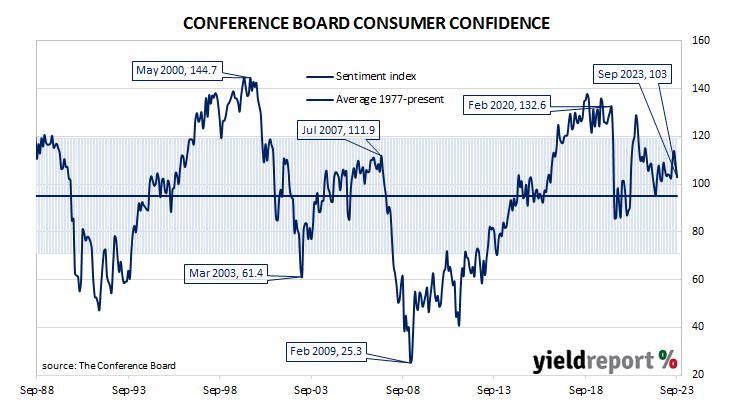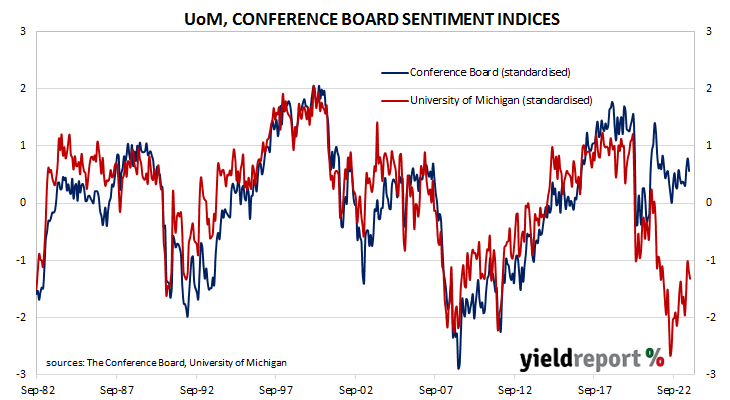Summary: Conference Board Consumer Confidence Index falls in September, reading less than expected; decline across all age groups, notably among household with incomes of $50,000 or more; views of present conditions improve, short-term outlook deteriorates; ANZ: Expectations Index below 80 historically signals recession within year.
US consumer confidence clawed its way back to neutral over the five years after the GFC in 2008/2009 and then went from strength to strength until late 2018. Measures of consumer confidence then oscillated within a relatively narrow band at historically high levels until they plunged in early 2020. Subsequent readings then fluctuated around the long-term average until March 2021 when they returned to elevated levels. However, a noticeable gap has since emerged between the two most-widely followed surveys.
The latest Conference Board survey held during the first half of September indicated US consumer confidence has deteriorated for a second consecutive month. September’s Consumer Confidence Index registered 103.0 on a preliminary basis, below the generally-expected figure of 105.9 as well as August’s final figure of 108.7.
“The decline in consumer confidence was evident across all age groups, and notably among consumers with household incomes of $50,000 or more,” said Dana Peterson, Chief Economist at The Conference Board.
US Treasury yields finished the day a little higher. By the close of business, the 2-year Treasury bond yields had returned to its starting point at 5.13%, the 10-year yield had inched up 1bp to 4.54% while the 30-year yield finished 3bps higher at 4.68%.
In terms of US Fed policy, expectations of a lower federal funds rate in the first half of 2024 firmed a touch. At the close of business, contracts implied the effective federal funds rate would average 5.375% in November, slightly more than the current spot rate, 5.41% in December and 5.435% in January. September 2024 contracts implied 5.05%, 28bps less than the current rate.
Consumers’ views of present conditions improved while their views of the near-future deteriorated. The Present Situation Index increased from August’s revised figure of 146.7 to 147.1 while the Expectations Index decreased from 83.3 to 73.7.
ANZ economist Kishti Sen noted the Expectations index’s fall below 80 and made a sobering observation. “A level below 80 has historically signalled a recession within a year.”
The Consumer Confidence Survey is one of two widely followed monthly US consumer sentiment surveys which produce sentiment indices. The Conference Board’s index is based on perceptions of current business and employment conditions, as well as respondents’ expectations of conditions six months in the future. The other survey, conducted by the University of Michigan, is similar and it is used to produce an Index of Consumer Sentiment. That survey differs in that it does not ask respondents explicitly about their views of the labour market and it also includes some longer-term questions.



